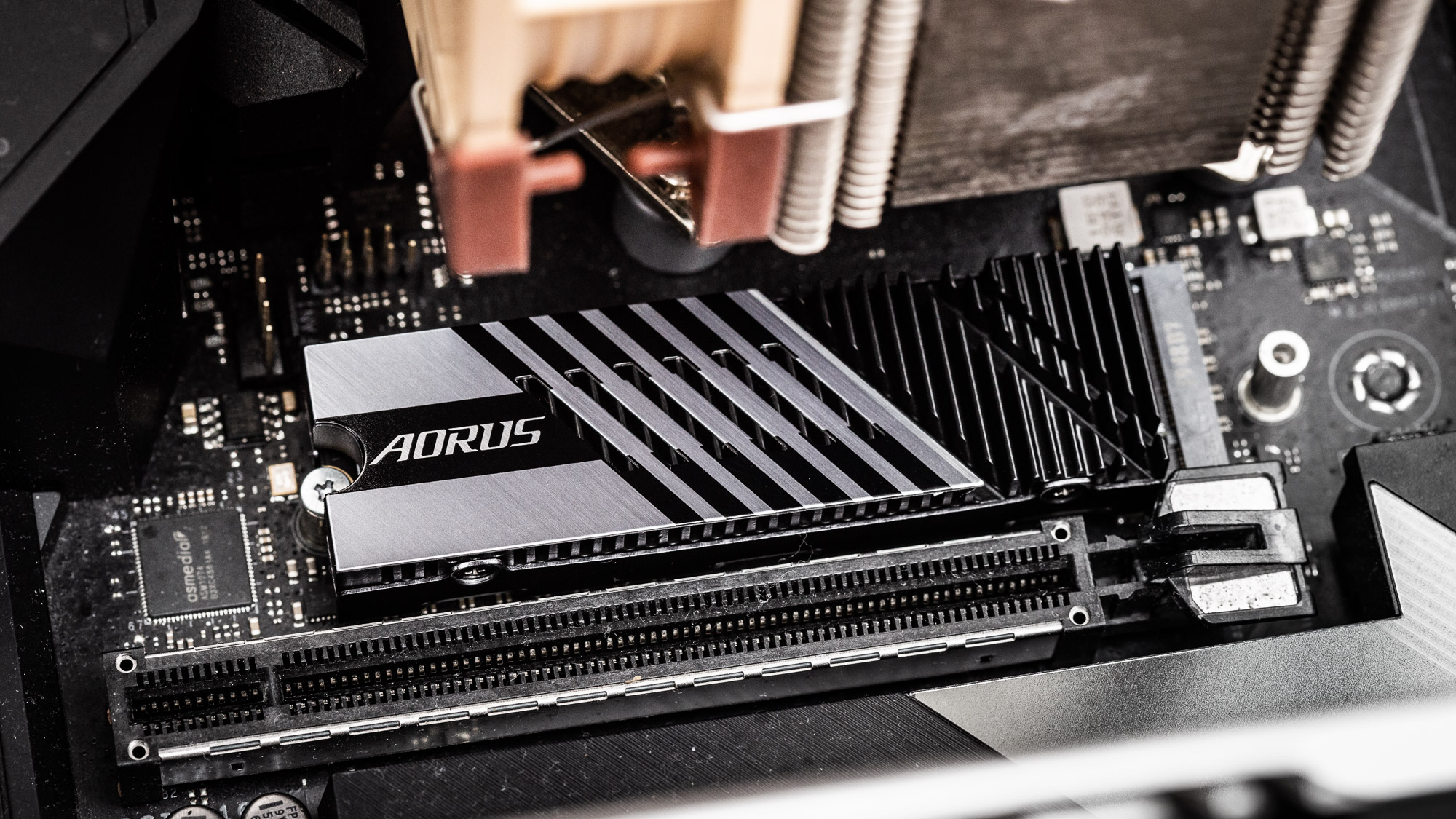Today, we have Gigabyte’s Aorus Gen4 7000s in the lab for review with cooling that is fit for an SSD that can gulp down over 8.5 watts of power. With an extremely well-crafted heatsink that is decked out with tons of fins, it’s ready for the harshest of workloads and will add some bling to a high-end gaming build. Designed to compete with the best SSDs, the Aorus Gen4 7000s dishes out up to 7 GBps and surprisingly, from testing, shows improvement over earlier Phison E18 NVMe SSD samples we’ve come across.
We’ve had our hands on many Phison PS5018-E18-based SSDs in the past few months and they all deliver very high performance. But with such high speed, these SSDs also have high power consumption in comparison to other SSDs such as Samsung’s 980 Pro and WD’s Black SN850, and concurrently, this results in high heat output in heavy usage, especially for the higher capacity models like Sabrent’s 4TB Rocket 4 Plus.
As awesome as Sabrent’s recently reviewed 4TB Rocket 4 Plus is, when relying solely on the thin heat spreader to keep it cool, it is still susceptible to throttling under massive write workloads. Because of this, many of these new Phison 18-powered SSDs are rolling out, equipped with heatsinks to ensure throttle-free, (or at least hopefully throttle-free), operation.
Corsair went as far as to develop both a heatsinked MP600 Pro as well as an MP600 Pro Hydro X edition for those with custom water-cooled rigs who demand completely throttle-free operation. In our hands, we now have Gigabyte’s Aorus Gen4 7000s, an interesting alternative that hasn’t gone to such drastic measures. Coming with a surface area maximized heatsink, the Aorus Gen4 7000s utilizes a more traditional design approach to tackle the minor heat problem, but what’s not so traditional is that it also incorporates a nanocarbon coating that is stated to reduce temperatures by 20%.
Specifications
| Product | Gen4 7000s 1TB | Gen4 7000s 2TB |
|---|---|---|
| Pricing | $209.99 | $389.99 |
| Capacity (User / Raw) | 1000GB / 1024GB | 2000GB / 2048GB |
| Form Factor | M.2 2280 | M.2 2280 |
| Interface / Protocol | PCIe 4.0 x4 / NVMe 1.4 | PCIe 4.0 x4 / NVMe 1.4 |
| Controller | Phison PS5018-E18 | Phison PS5018-E18 |
| DRAM | DDR4 | DDR4 |
| Memory | Micron 96L TLC | Micron 96L TLC |
| Sequential Read | 7,000 MBps | 7,000 MBps |
| Sequential Write | 5,500 MBps | 6,850 MBps |
| Random Read | 350,000 IOPS | 650,000 IOPS |
| Random Write | 700,000 IOPS | 700,000 IOPS |
| Security | AES 256-bit encryption | AES 256-bit encryption |
| Endurance (TBW) | 700 TB | 1,400 TB |
| Part Number | GP-AG70S1TB | GP-AG70S2TB |
| Warranty | 5-Years | 5-Years |
The Gigabyte Aorus Gen4 7000s is available in two capacities, 1TB and 2TB, priced at $210 and $390, respectively. Gigabyte rates each capacity to hit 7,000 MBps read, but the 1TB is rated to deliver 5,500 MBps write while the 2TB model can hit 6,850 MBps write. In terms of peak random performance, the SSD is rated capable of up to 650,000 / 700,000 random read/write IOPS at the highest capacity.
Gigabyte backs the Aorus Gen4 7000s with a 5-year warranty and each comes with respectable write endurance ratings – up to 700TB per 1TB in capacity. Such high endurance is thanks to Phison’s fourth-generation LDPC and RAID ECC, wear leveling, a bit of over-provisioning. Also, like Corsair’s MP600 Pro, the SSD supports AES 256-bit hardware encryption, perfect for those on the go who need to meet security compliance standards when handling sensitive data.
Software and Accessories
Gigabyte provides a basic SSD Toolbox that can read the SSD’s health, S.M.A.R.T. data, as well as secure erase it (assuming it’s a secondary drive).
A Closer Look
Image 1 of 3
Image 2 of 3
Image 3 of 3
Gigabyte’s Aorus Gen4 7000s comes in an M.2 2280 double-sided form factor. The included aluminum heatsink measures 11.5 x 23.5 x 76 mm and the black and silver two-tone looks fantastic, too. We’re not too sure how much the nanocarbon coating helps by itself, but based on the way this heatsink is designed, we’re fairly confident that there is plenty of surface area to dissipate all the heat it needs to without it. The SSD is sandwiched between two thick thermal pads that transfer heat from the PCB to the heatsink and baseplate.
Image 1 of 2
Image 2 of 2
As mentioned, Gigabyte’s Aorus Gen4 7000s is powered by Phison’s second-generation PCIe 4.0 x4 SSD controller, the PS5018-E18. It leverages DRAM and features a triple-core architecture that is paired with the company’s CoXProcessor 2.0 technology (an extra two R5 CPU cores) for fast and consistent response. The main CPU cores are Arm Cortex R5’s clocked at 1 GHz, up from 733MHz on its predecessor, the PS5016-E16, while the CoXProcessor 2.0 cores are clocked slower for better efficiency.
Image 1 of 3
Image 2 of 3
Image 3 of 3
Our 2TB sample comes with 2GB of DDR4 from SK hynix, split amongst two DRAM ICs, one on each side of the PCB. These chips interface with the controller at speeds clocking 1,600 MHz and consume 1.2V. Additionally, there are eight NAND flash emplacements in total for storage, each containing 256GB of Micron’s 512Gb 96L TLC flash (32 dies in total). This NAND operates at fast speeds of up to 1,200 MTps and features a quad-plane architecture for fast, responsive performance.
MORE: Best SSDs
MORE: How We Test HDDs And SSDs
MORE: All SSD Content
